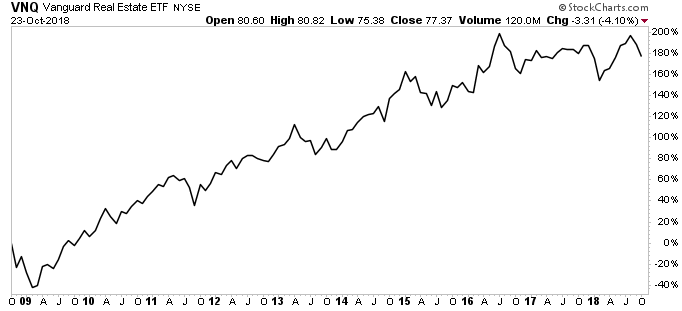How to Earn Monthly Rental Income (Even If You Hate Dealing With Tenants)

These Trusts Yield Up to 24%
Many of us have thought about buying a rental property—that is, if we didn’t haven’t to deal with those dang tenants.
Everyone has heard the landlord horror stories of a crazy renter tearing up the place. And if a deadbeat tenant stops paying the bills, it’s almost impossible to evict them.
But even if you snag a good renter, landlord living isn’t all rainbows and buttercups. Who wants to spend their “golden years” mowing lawns, fixing clogged toilets, and collecting security deposits?
Fortunately, there’s an answer.
For the past decade, I’ve earned steady rental income through a unique kind of investment called real estate investment trusts (REITs). These firms buy investment properties, collect rent from tenants, and pass on the income to investors.
In effect, REITs allow you to get into the property business without screening tenants or painting bathrooms. And for those looking to boost their portfolio income, these firms make for a compelling investment option. Here’s why.
First and foremost, real estate investment trusts have produced sizzling returns.
Prologis Inc (NYSE:PLD), which owns hundreds of industrial warehouses around the world, has posted a total return, including dividends, of 380% over the past 10 years. American Tower Corp (NYSE:AMT) tops the pack with a jaw-dropping 422% total return since 2009.
But even the typical REIT has shot the lights out over the past few years. Since 2009, the Vanguard Real Estate ETF (NYSE:VNQ), which serves as a good barometer of industry investment returns, has soared by 210%. That beats the pants off of the broader S&P 500 over the same period.

Chart courtesy of StockCharts.com
The secret comes down to what REITs can include in their investment portfolio. These businesses often buy up the real estate equivalent of trophy assets, from high-end malls in New York or San Francisco to skyscrapers in Boston or Tokyo. In many cases, REITs grant us access to some amazing deals that we’d otherwise have no ability to own ourselves.
Moreover, REITs come with a lot fewer headaches. Between deadbeat tenants, renovating properties, and midnight phone calls, owning a rental property has a lot of downsides. If a tenant skips rent, you’re still responsible for the mortgage payment.
REITs put everything on autopilot. A professional management team handles all of the day-to-day operations. A check arrives in my brokerage account each month, which I spend on bills, dinners out, or my next vacation.
Most firms also trade publicly on a stock exchange. This allows investors to buy and sell units far more easily than a physical rental property. And because you can buy as few as one unit in a business, prospective investors can get started with as little as $20.00.
REITs also make for a great income stream. By law, management must pay out most of their profits to unitholders as distributions. While this payout ratio varies, it’s usually at least 90%.
As a result, REITs pay out some of the highest yields around. It’s not uncommon to find reliable payouts in the mid-teens. And because executives often raise rents each year, these distributions usually grow over time.
|
Company |
Market Cap |
Yield |
|
CBL & Associates Properties, Inc. |
$578.0 Million |
24% |
|
New Senior Investment Group Inc |
$467.0 Million |
16.5% |
|
Washington Prime Group Inc |
$1.2 Billion |
16.1% |
|
American Hotel Income Properties REIT |
$696.0 Million |
9.9% |
|
True North Commercial REIT |
$387.0 Million |
9.2% |
(Source: Yahoo! Finance, last accessed October 24, 2018.)
Of course, you can’t call real estate investment trusts a guaranteed investment.
Management teams don’t work for free, for one. Their salaries cost money, which bites into your investment returns.
REITs also have above-average exposure to interest rates. Because they compete directly with bonds for capital, units often drop in value as yield rise.
That said, I consider the price of paying executives well worth the peace of mind. Rental properties also have the same exposure to rising interest rates.
My advice? Every investor should give REITs a second look. If you want high, relatively predictable returns, backed by real assets, then this investment niche is worth investigating further.











